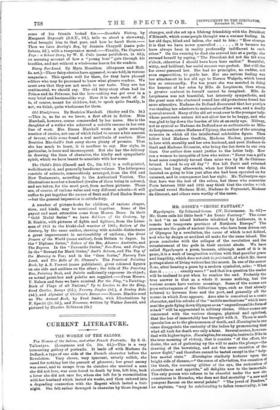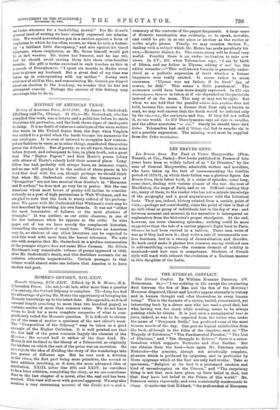MR. GOSSE'S " IRONIC FANTASY."
Hypolympia. By Edmund Goose. (W. Heinemann. 3s. 6d.)— Mr. Gosse calls his little book " An Ironic Fantasy." The scene is laid "in an island hitherto inhabited by Lutherans, in a remote but temperate province of Northern Europe." The persons are the gods of ancient Greece, who have been driven out of Olympus by a revolution, the cause of which is not defined, sad who by design or accident all make for the same island. The poem concludes with the collapse of the revolution and the reinstatement of the gods in their ancient abode. We have called Hypolympia a poem, because, although most of it is in prose, it is a work of imagination written with that peculiar grace and limpidity, which does not sink to preciosite, of which Mr. Gosse perhaps alone of living writers has the secret. In one of the scenes Zeus, after hearing .a poem by a modern symbolist, asks : " What does it exactly mean I " and that is a question the reader will be inclined to put when he reaches the end. Probably the true answer is that as a whole it means nothing, but the various scenes have various meanings. Some of the scenes are pure extravaganza of the Gilbertian type, such as that already referred to between Zeus and the poet, and generally all the scenes in which Zeus appears. Ares also is conceived as a comic character, and his rebuke of the "mobile mechanisms" which have sent the gods flying down Olympus as an" ungentlemanlike form of attack" will be appreciated in military circles. Other scenes are concerned with the various changes, physical and spiritual, that the loss of immortality has brought with it. There is much speculation as to the phenomenon of death, and Esculapius in one scene disappoints the curiosity of the ladies by pronouncing that what all took for death was only a faint. Several scenes, however, deal with higher topics. ZEsculapius, for example, instructs Nike in the true meaning of victory, that it consists " of the effort, the desire, the act of gathering up the will to make the plunge—the drawing of the bowstring, and not the mere cessation of the arrow flight," and therefore cannot be tasted except in the " help- less mortal state." JEsculapius similarly lectures upon the bright side of disease,—" the sense of alleviation, the cessation of the throb, the resuming glitter of the eye, the restoration of cheerfulness and appetite," all delights new to the immortals. The only person who refuses to be cheerful under the new cir- cumstances is Heracles, who does not find mortality "a new and pungent flavour on the moral palate." " The jewel of Pandora,, he explains, "may be exhilarating to fallen immortality, it has no lustre whatever for a backsliding mortal." For Mr. Gosse's • general level of writing we have already expressed our admira- tion. We would nevertheless put in a caution against a form of euphuism to which he too often recurs, as when he calls a butter- fly "a brilliant little discrepancy," and also against his tinsel epigrams, whose crepitation, as Mr. Gosse himself would put it, at last wearies. Mr. Geese has humour, and he has wit, but he should avoid casting them into these over-familiar moulds. His gift is better exercised in such touches as this in a speech of Persephone's : " I spent six months in Hades every year to please my husband. But a great deal of my time was taken up in corresponding with my mother." Seeing such evidence of skill as this, and remembering Mr. Gosse's jeu d'esprit about an election to the Academy, we wonder that he has not attempted comedy. Perhaps the success of this fantasy may encourage him to do so.



























































 Previous page
Previous page